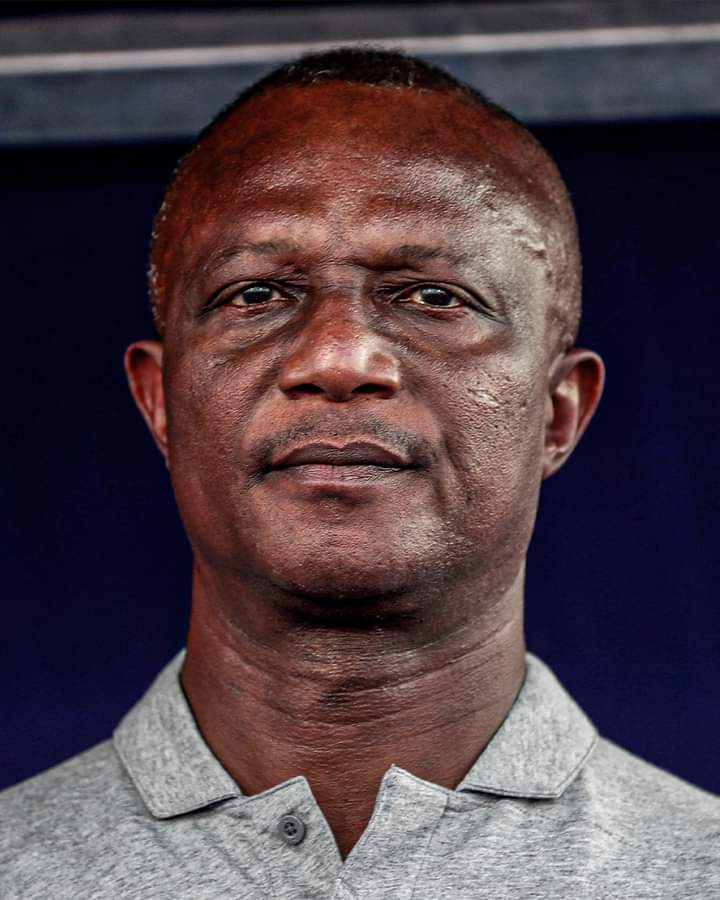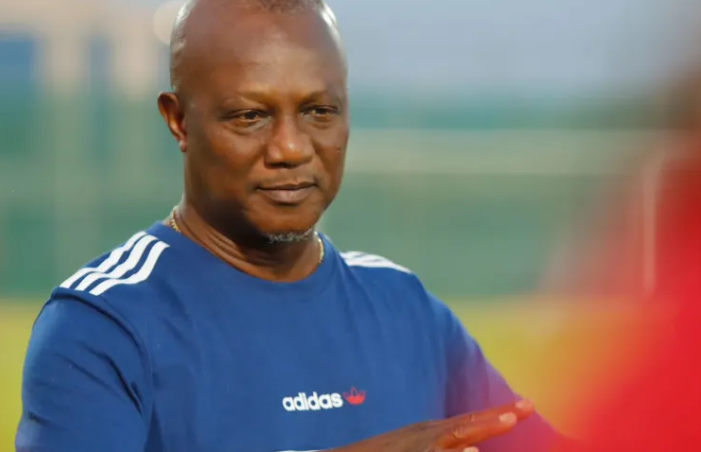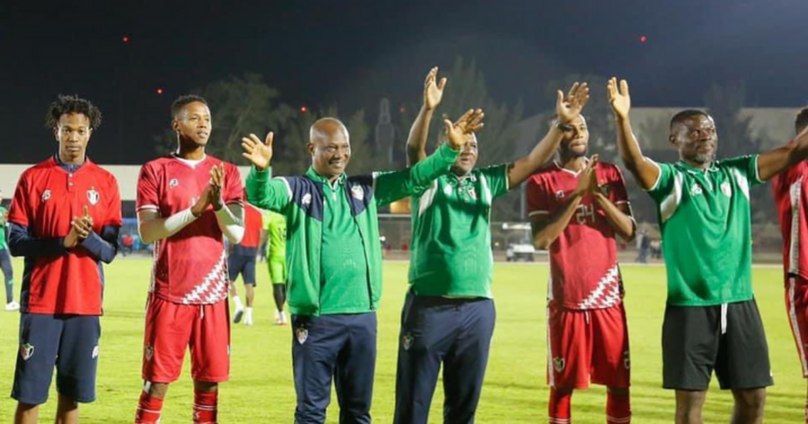"In our field of work," Kwasi Appiah says, folding his arms with a slight chuckle, "you'll have so many criticisms: some positive and others negative.
"The most important thing is to learn from the negatives and see whether they will help you along the line, and the positive criticisms encourage you."
It was about five years ago. Ghana had just narrowly beaten Kenya in a 2019 AFCON qualifier, a match where Caleb Ekuban’s late goal secured a win before a packed Accra stadium.
The result elicited mixed feelings among fans and critics alike, with many quick to scrutinise Appiah’s decisions. This was a familiar territory and he knew it.
In the world of football, few figures have navigated as challenging a path as Kwasi Appiah. The former Black Stars coach, now leading the Sudan national team, has consistently faced an uphill battle for recognition and appreciation, and he did not expect anything different.
During his two stints with Ghana's senior national team, his efforts often seemed overshadowed by controversy and criticism.
He has never been considered a man who ascended the throne of the national team technical leadership through his knowledge, but rather a figure placed at the front by dint of his alleged political connections with highly ranked officials in government, especially during his second tenure.
To put it bluntly, he has always been a government appointee. It's up to you to believe what you want, but this "government appointee" reached the semi-final of the 2013 AFCON in South Africa and navigated Ghana's qualification to the FIFA World Cup in Brazil in 2014, defeating AFCON record holders Egypt en route.

Many believed he was the reason Ghana lost to Burkina Faso in the semi-finals of that tournament, and he was equally blamed for the country's early exit from the 2014 World Cup in Brazil, where Ghana faced global scrutiny.
In his second stint, he qualified the Black Stars for the AFCON in Egypt. However, under a Normalisation Committee, the team had a disappointing AFCON in Egypt, exiting at the round of 16 after a penalty shootout loss to Tunisia.
He began the qualification phase for the next tournament on a good note, beating South Africa in Cape Coast and following up with another win over São Tomé and Príncipe.
These results were not good enough for his employers, who eventually showed him the exit door. The reasons remain unclear, but it highlights the disrespect Appiah endured, even under Dr Kofi Amoah's Normalisation Committee, which threatened him with a sack and salary reduction.
Appiah's tactical acumen and leadership were pivotal during his tenure. He was never a square peg in a round hole as many postulated and the results he chalked evidenced that. Yet, despite these accomplishments, he has frequently been undervalued and underappreciated in his homeland.

After that victory over the Harambee Stars in March 2019 to seal Ghana's eighth consecutive AFCON ticket, he remarked, "It's always been said that no prophet is pampered in his own country. Just do the best you can. If it goes well, that's what the nation wants; if it doesn't, you move on with your life and hope that things get better."
He did his best, but it was not enough per his bosses, and as he said in the latter part, "...you move on with your life and hope that things get better."
When the FA moved him on, he moved on, too.
For nearly four years, he was jobless until Sudan came knocking at a time he had ushered himself into the ecosystem of football politics.
The two happened simultaneously, and he accepted both. One would argue that, Appiah should have chosen one, but it was his discretion since no law barred him from serving the two roles.

He embraced Sudan, and since assuming his role as head coach, the Sudanese national team has been unbeaten in six of their last seven games and currently tops their 2026 World Cup qualifying group, which includes 2021 AFCON champions Senegal.
In equal measure, he has barely played a role in the Executive Council of the Ghana FA and does not serve on any of its committee.
Clearly, his loyalty appears to be defined since his life is spent with current employer, but we are here at a point where the forgotten man has come under spotlight again.
Indeed many had forgotten about Appiah until the AFCON 2025 draw last Thursday pitted Ghana against its former coach. Suddenly, Ghanaians remembered one of their own is in charge of the Sudanese national team.
Moreover, many are now aware that he's an Executive Council member of the GFA, responsible for developing football to enviable standards.
Kwasi Appiah is bound by the statutes and ethics governing Ghana football and should not be seen engaging in any activity that does not represent the interest of Ghana football. In fact, he took an oath to protect the interest of Ghana football.
To prepare, select, and lead Sudan against Ghana in the 2025 AFCON qualifier is problematic and should not be countenanced.
The man who took an oath to protect the interest of Ghana football would rather lead another federation seeking to beat a federation he's part of.

His dual role raises questions about his ability to fulfil this responsibility without conflicting interests. It is unheard of. The position he finds himself is quite peculiar.
I have never seen, heard, or come across anything like that before.
It is a genuine conversation to have, but the former Ghana captain's situation is nuanced.
While his position as Sudan’s head coach potentially places him in a conflict of interest, especially when Sudan faces Ghana in competitions, the solution lies in transparency.
Full disclosure to the GFA and the Sudanese FA about his dual roles can mitigate the potential breach of ethics, and this I reckon was duly and known by both parties.
Article 19 (1) of the GFA Code of Ethics states that "Persons bound by this code shall not perform their duties (in particular, preparing or participating in the taking of a decision) in situations in which an existing or potential conflict of interest might affect such performance."
"A conflict of interest arises if a person bound by this code has, or appears to have, secondary interests that could influence their ability to perform their duties with integrity in an independent and purposeful manner. Secondary interests include but are not limited to, gaining possible advantage for the persons bound by this code themselves or related parties as defined in this code.
2. "Before being elected, appointed, or employed, persons bound by this code shall disclose any relations and interests that could lead to situations of conflict of interest in the context of their prospective activities.
3. "Persons bound by this code shall not perform their duties (in particular, preparing or participating in the taking of a decision) in situations in which there's a danger that conflict of interest might affect such performance. Any such conflict shall be immediately disclosed and notified to the organisation for which the person bound by this code performs their duties."
I will not refer you to the FIFA Code of Ethics because the GFA lifted that verbatim into theirs, so I won't bother you with that.
I am not a lawyer and I won't pretend to be one or understand the law, but reading this aspect of the Code of Ethics clearly suggests that conflict of interest is not plain and white as many emotionally run with it. It requires deep reflection and a chunk of it is dependent on the judicial bodies and the individual involved.

If you're found in a position of conflict of interest, it does not bar you from going about your activities without hindrance.
Article 19, paragraphs 2 and 3 are clear on this: just disclose your interests that could lead to situations of conflict of interest to the organisation, and the matter will be resolved.
The principle of full disclosure is crucial. If the Sudanese FA is fully aware of Appiah’s membership in the GFA Executive Council, the perceived conflict may be ameliorated or even nullified.
The key words per 19(2), are, "before being elected, or appointed..." Did Sudan know Appiah was serving on the ExCo before concluding the deal, yes.
Did the Ghana FA know Appiah was accepting Sudan national team job, yes.
If these are fulfilled, I shudder to appreciate where the challenge is about his role or loyalty lies.
In the broader context, it is important to consider that other members of the GFA Executive Council, including the FA president, own or manage clubs and still engage in competitive matches.
These situations, often seen as potential conflicts, are managed through the same ethical frameworks and disclosures.
Article 40 of the GFA Statutes states that "Any member of the Executive Council must withdraw from the debate and from taking a decision if there is any risk or possibility of a conflict of interests."
It is the reason why the GFA President, the leader of the ExCo who is a shareholder of Dreams FC, is believed to be neutral when his club, in which he invests money weekly to compete in the Ghana Premier League, engages an opponent for three points.
If the first gentleman of the country's football can remain neutral when his business is involved, why can't Appiah be neutral or also recuse himself when his employer is involved?
If Appiah’s colleagues can play dual roles without failing the test of conflict of interest, Appiah, who is a professional should equally be in a position to do his job diligently.
Should he recuse from the ExCo decisions and focus on Sudan during these two matches, it's his discretion. If he feels he can't be neutral, the regulations are clear on what to do.
It is okay to understand the arguments of many. From where I sit, Appiah will have deep knowledge about Ghana in the build-up go the matches if information is shared with ExCo, especially if they are discussed on their WhatsApp platforms.
That ultimately gives him and Sudan an unfair advantage over Ghana because of his privileged position and no sane person should condone that.
What about his colleagues? Do they not work for institutions with competing interests?
If Appiah’s role is such that he can't combine the two, then no ExCo member should be allowed to have interest or work for any club or member of the GFA.
If businessmen are perceived to be neutral when their businesses are involved, why can't an employee of a competing federation?
Latest Stories
-
African diplomatic missions strengthen capacities to protect migrant workers in Arab States
6 minutes -
Esther A.N. Cobbah: A Beacon of Purposeful Communication
14 minutes -
No power crisis looming – Energy Minister assures
17 minutes -
DJ Mensah Foundation donates desks, learning materials to Akokoase AEDA School
25 minutes -
AI4SD introduces indigenous AI-integrated weather forecasting system for farmers in Kwabeng
46 minutes -
Climate change: AGN calls for a ‘Just Transition’ that addresses Africa’s energy poverty
51 minutes -
DWM celebrates 43 years of empowering Ghanaian women
1 hour -
Notorious armed robber jailed for life, gets 120 years for killing pharmacist in Kumasi
1 hour -
Yendi Solar Project: Bui Power Authority starts disbursement of compensation to landowners
1 hour -
Mahama commends Ato Forson and BoG Governor for spearheading economic turnaround
2 hours -
NPP Flagbearership: What has each prospective candidate done for Ghana in public office?
2 hours -
Samira Bawumia Literature Prize announces call for entries for 2025 edition
2 hours -
Bril and Kwabena Wonda drop uplifting new single ‘He Lives’
2 hours -
Why the NDC majority shields Mahama from impeachment—even amid constitutional Concerns
2 hours -
At dawn they hunt: The sacred ritual of Aboakyer’s deer chase
2 hours

